Trademark Attorney Resume Examples

Jul 18, 2024
|
12 min read
Craft a winning trademark attorney resume: your guide to standing out in the legal field. Get tips on showcasing your intellectual property expertise, professional experience, and skills without missing a beat. Ready, set, trademark your success!
Rated by 348 people
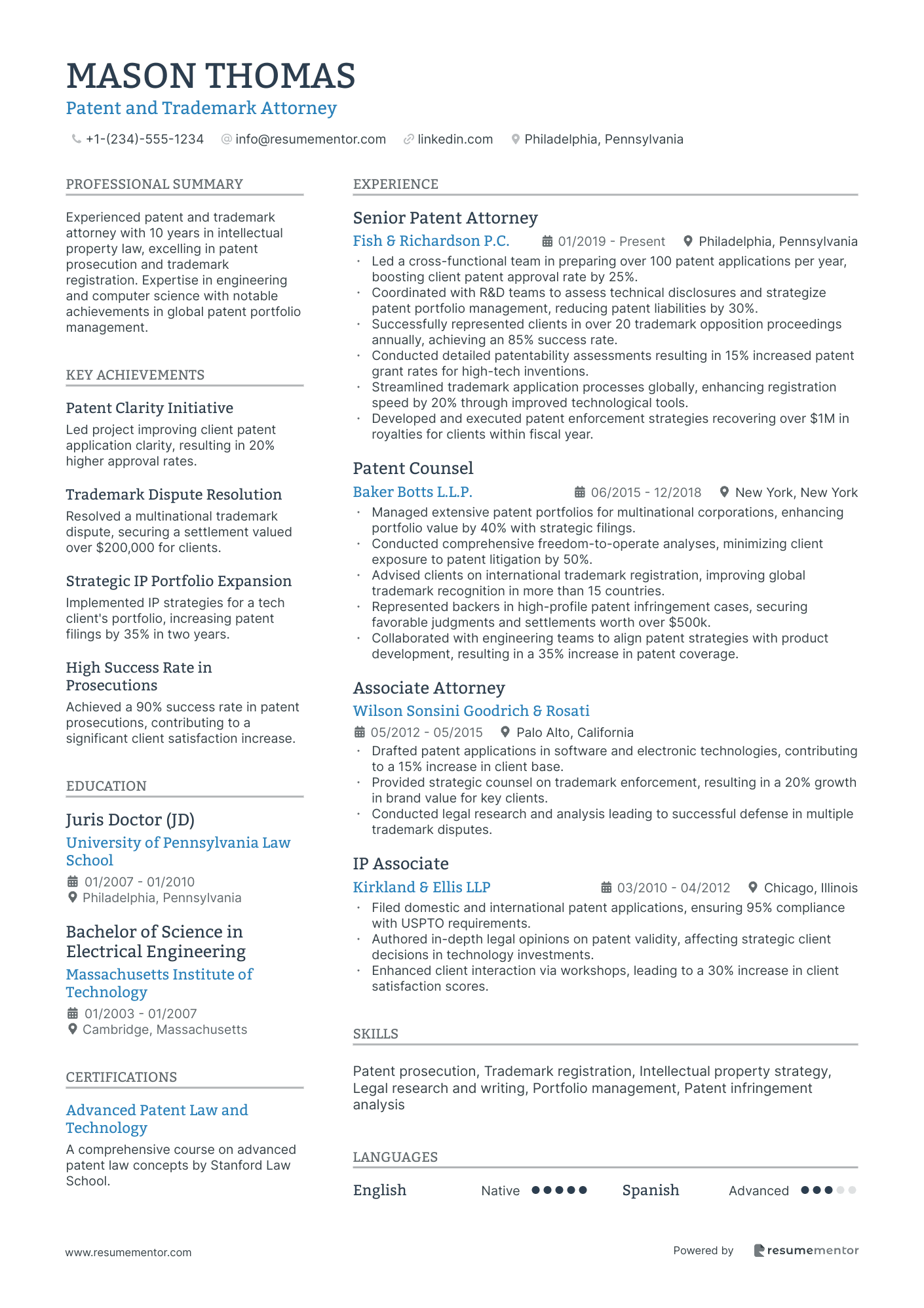
Patent and Trademark Attorney
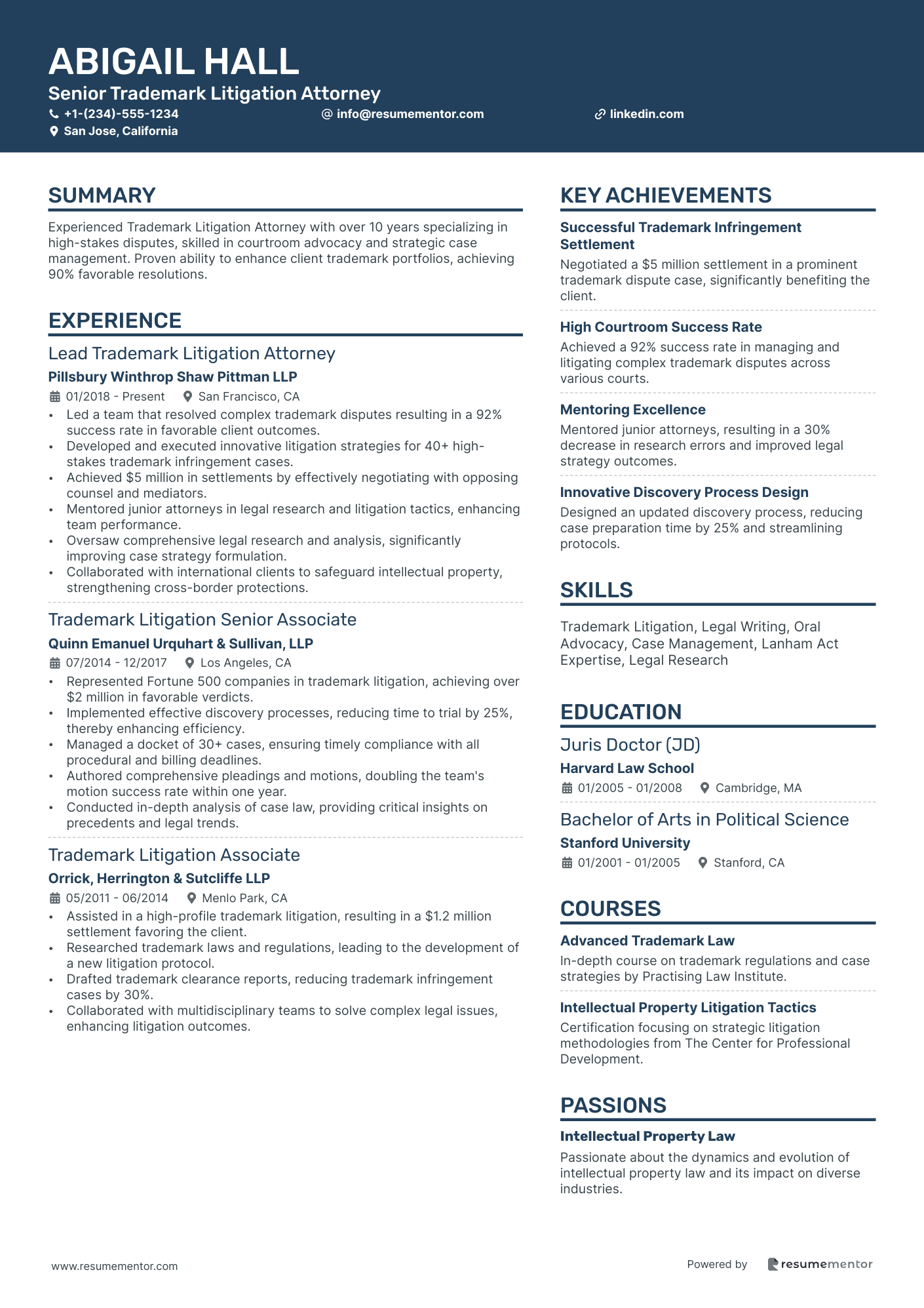
Senior Trademark Litigation Attorney
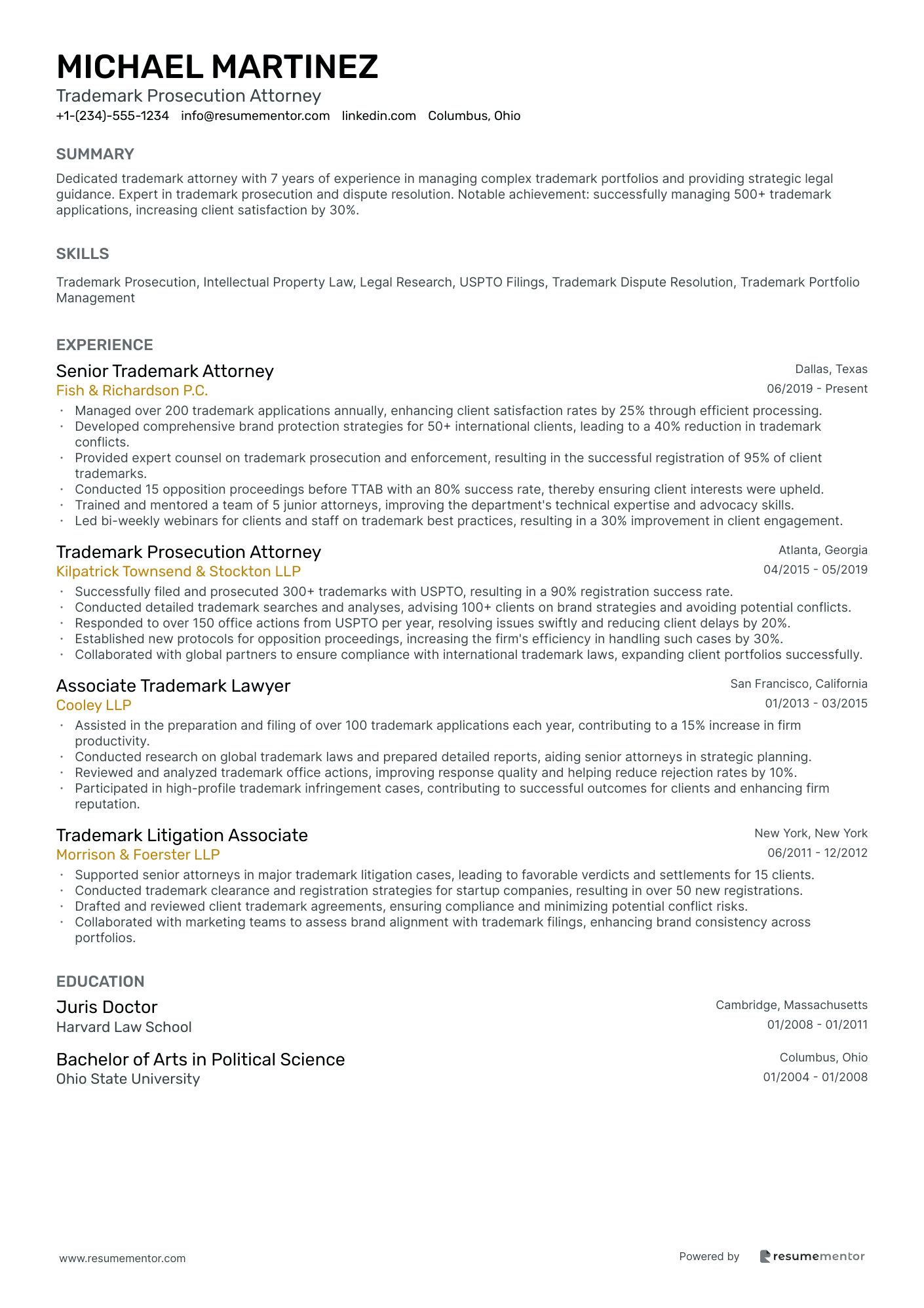
Trademark Prosecution Attorney
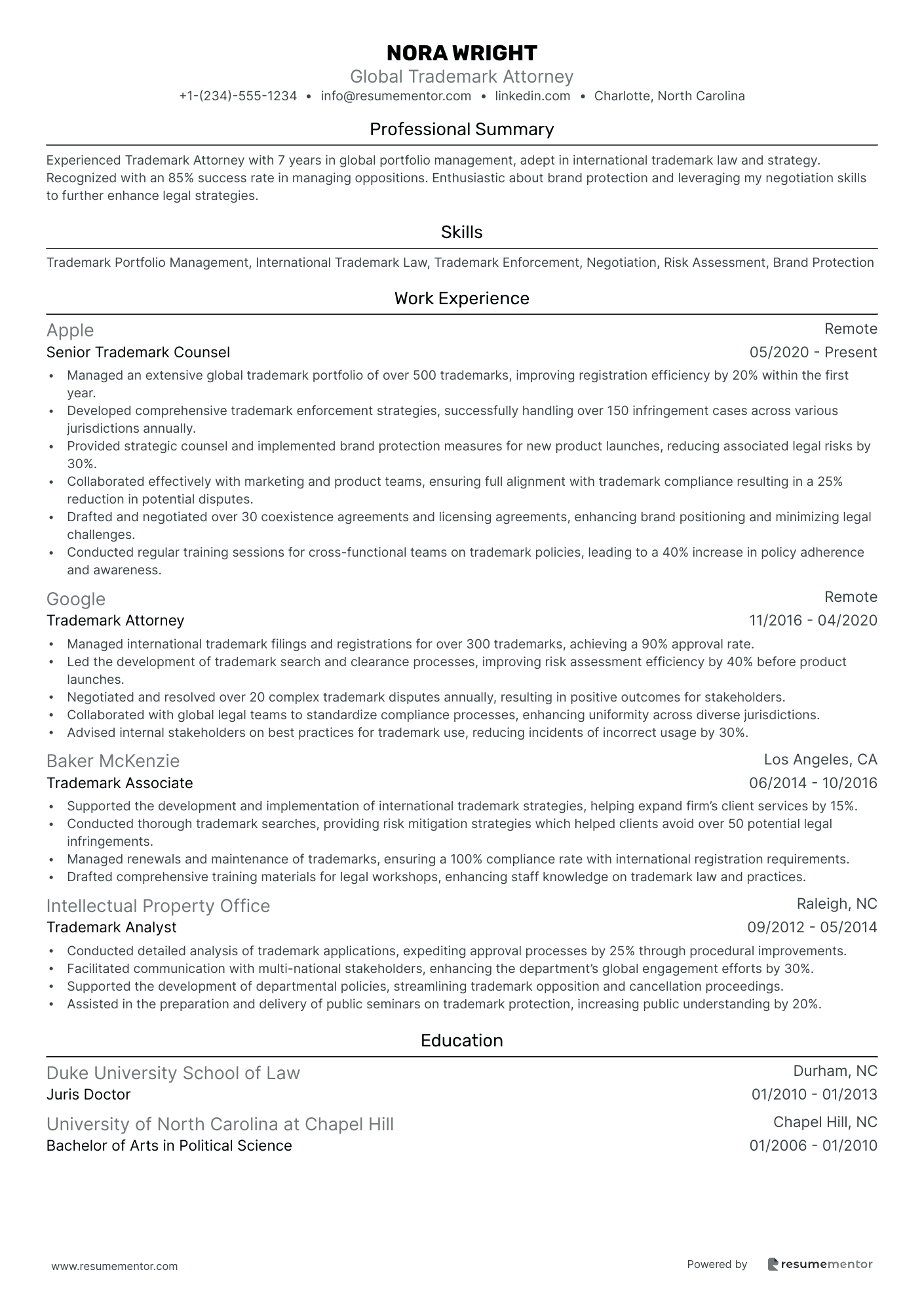
Global Trademark Attorney
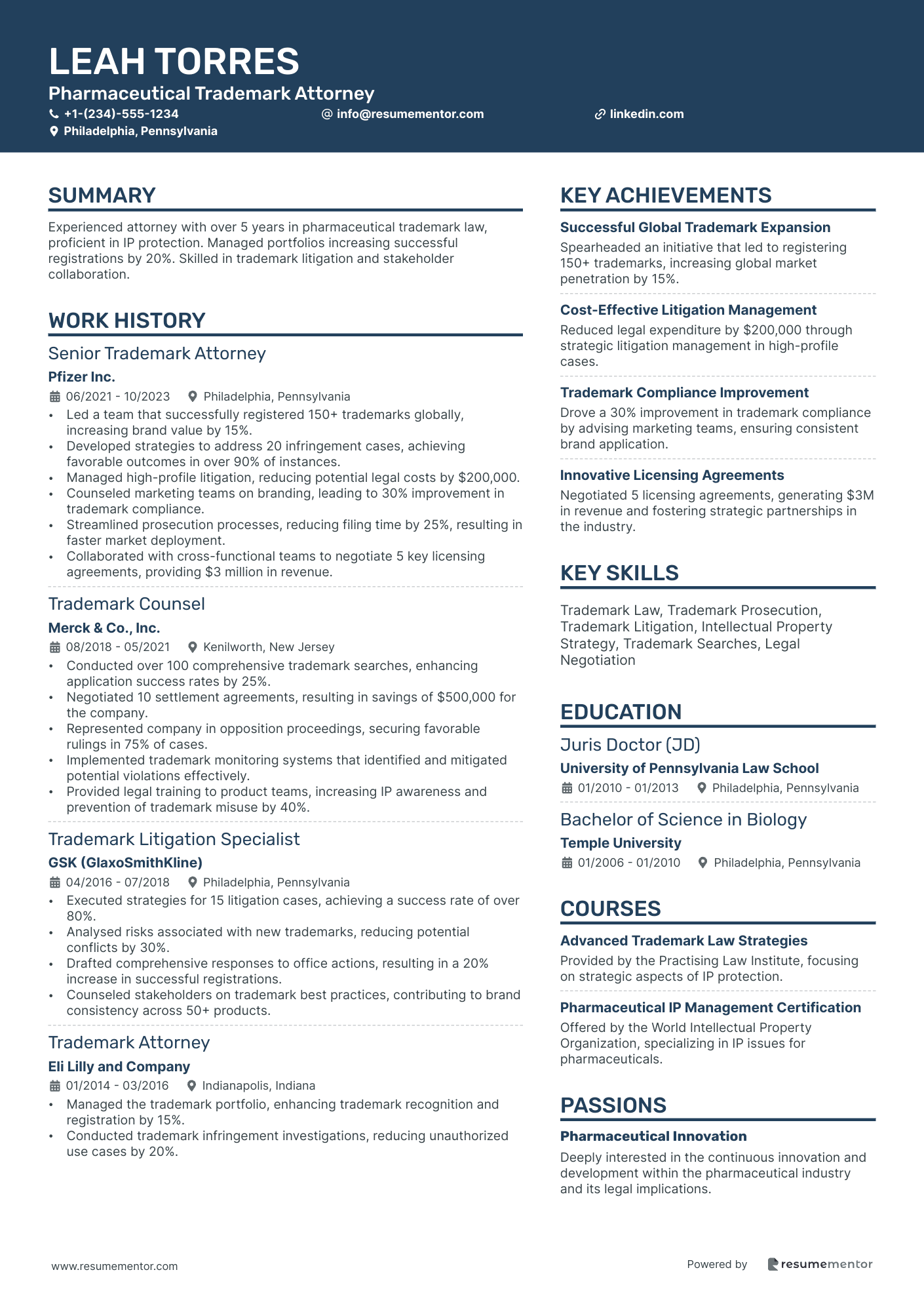
Pharmaceutical Trademark Attorney
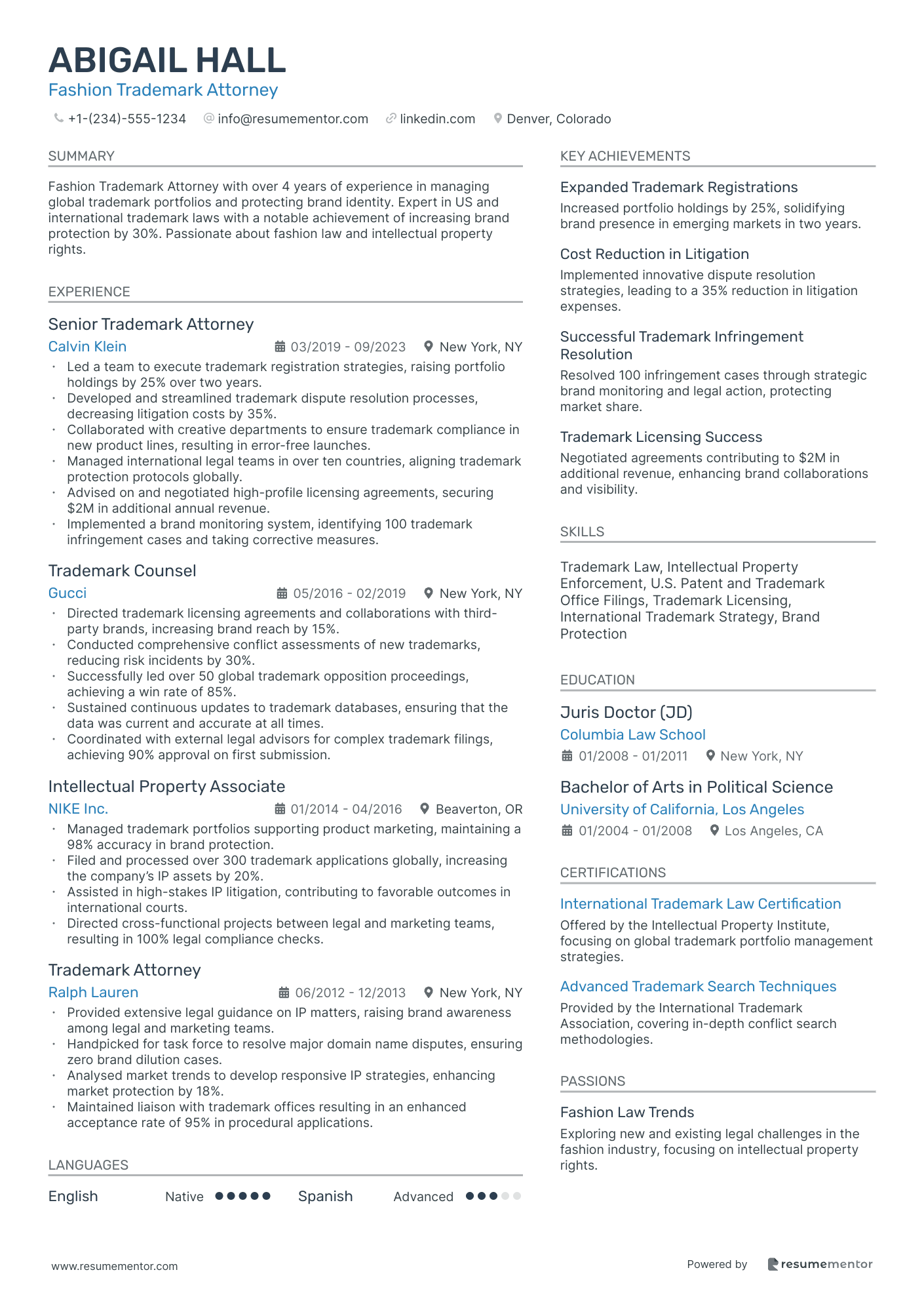
Fashion Trademark Attorney
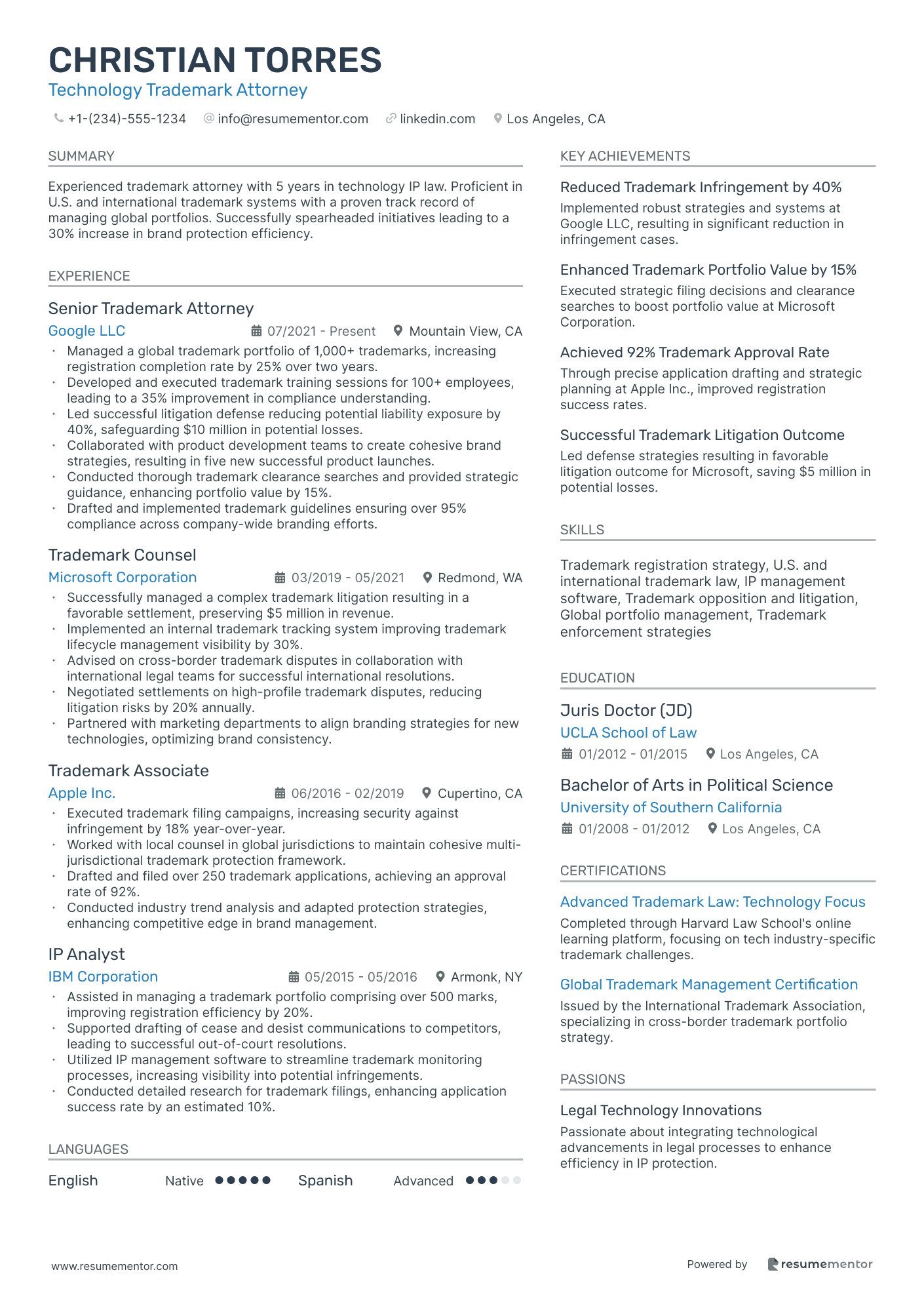
Technology Trademark Attorney
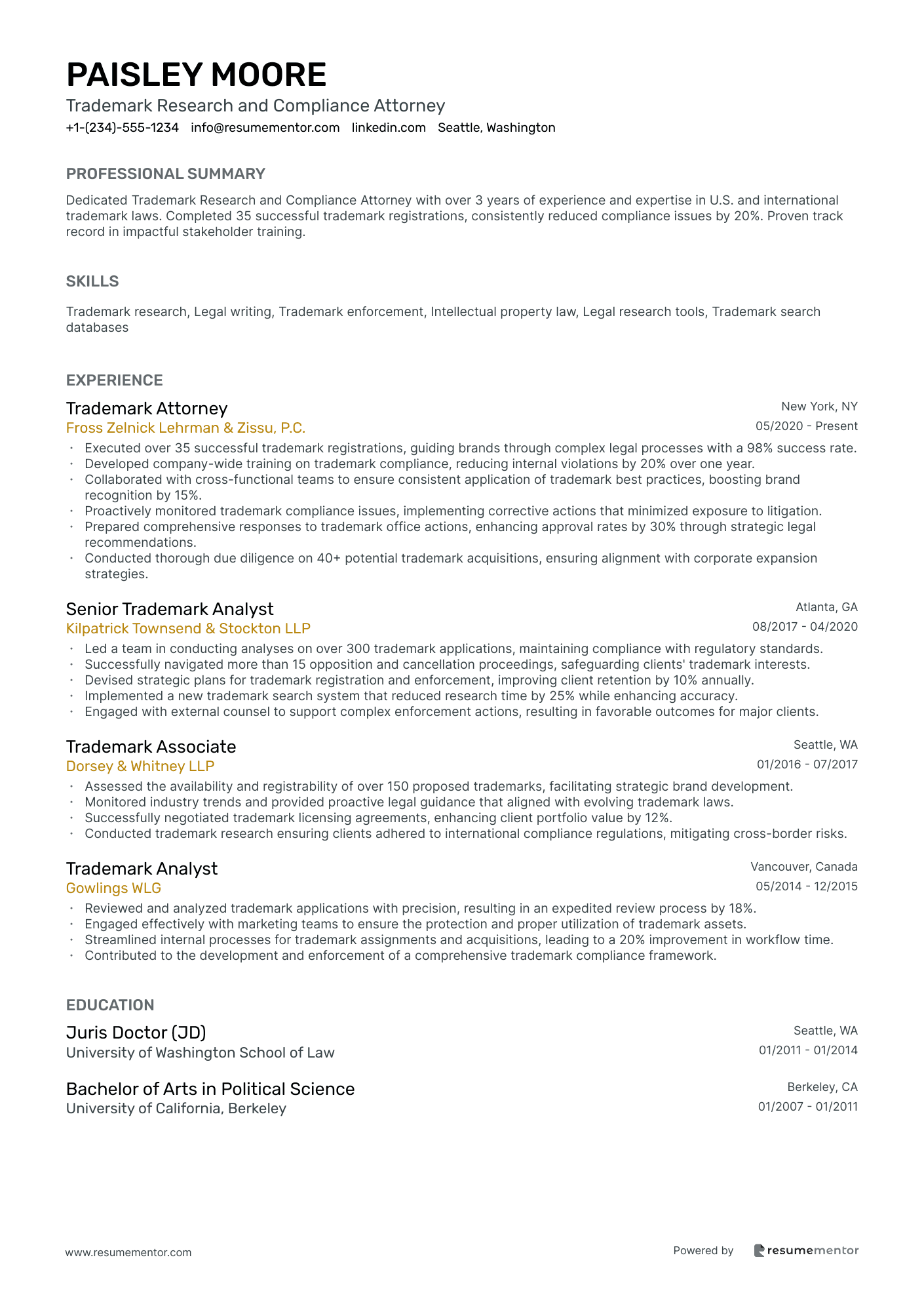
Trademark Research and Compliance Attorney
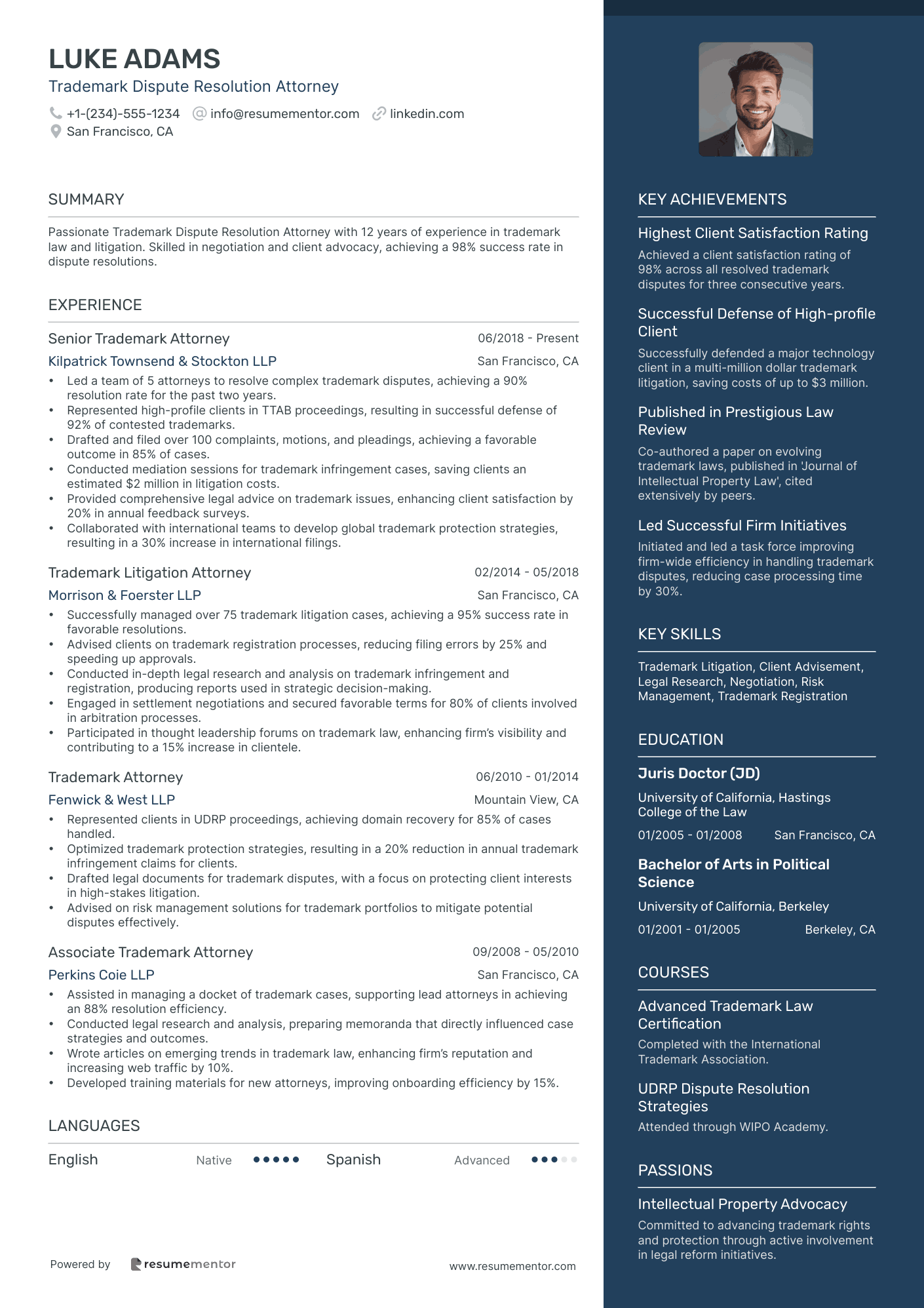
Trademark Dispute Resolution Attorney

Patent and Trademark Attorney resume sample
- •Led a cross-functional team in preparing over 100 patent applications per year, boosting client patent approval rate by 25%.
- •Coordinated with R&D teams to assess technical disclosures and strategize patent portfolio management, reducing patent liabilities by 30%.
- •Successfully represented clients in over 20 trademark opposition proceedings annually, achieving an 85% success rate.
- •Conducted detailed patentability assessments resulting in 15% increased patent grant rates for high-tech inventions.
- •Streamlined trademark application processes globally, enhancing registration speed by 20% through improved technological tools.
- •Developed and executed patent enforcement strategies recovering over $1M in royalties for clients within fiscal year.
- •Managed extensive patent portfolios for multinational corporations, enhancing portfolio value by 40% with strategic filings.
- •Conducted comprehensive freedom-to-operate analyses, minimizing client exposure to patent litigation by 50%.
- •Advised clients on international trademark registration, improving global trademark recognition in more than 15 countries.
- •Represented backers in high-profile patent infringement cases, securing favorable judgments and settlements worth over $500k.
- •Collaborated with engineering teams to align patent strategies with product development, resulting in a 35% increase in patent coverage.
- •Drafted patent applications in software and electronic technologies, contributing to a 15% increase in client base.
- •Provided strategic counsel on trademark enforcement, resulting in a 20% growth in brand value for key clients.
- •Conducted legal research and analysis leading to successful defense in multiple trademark disputes.
- •Filed domestic and international patent applications, ensuring 95% compliance with USPTO requirements.
- •Authored in-depth legal opinions on patent validity, affecting strategic client decisions in technology investments.
- •Enhanced client interaction via workshops, leading to a 30% increase in client satisfaction scores.
Senior Trademark Litigation Attorney resume sample
- •Led a team that resolved complex trademark disputes resulting in a 92% success rate in favorable client outcomes.
- •Developed and executed innovative litigation strategies for 40+ high-stakes trademark infringement cases.
- •Achieved $5 million in settlements by effectively negotiating with opposing counsel and mediators.
- •Mentored junior attorneys in legal research and litigation tactics, enhancing team performance.
- •Oversaw comprehensive legal research and analysis, significantly improving case strategy formulation.
- •Collaborated with international clients to safeguard intellectual property, strengthening cross-border protections.
- •Represented Fortune 500 companies in trademark litigation, achieving over $2 million in favorable verdicts.
- •Implemented effective discovery processes, reducing time to trial by 25%, thereby enhancing efficiency.
- •Managed a docket of 30+ cases, ensuring timely compliance with all procedural and billing deadlines.
- •Authored comprehensive pleadings and motions, doubling the team's motion success rate within one year.
- •Conducted in-depth analysis of case law, providing critical insights on precedents and legal trends.
- •Assisted in a high-profile trademark litigation, resulting in a $1.2 million settlement favoring the client.
- •Researched trademark laws and regulations, leading to the development of a new litigation protocol.
- •Drafted trademark clearance reports, reducing trademark infringement cases by 30%.
- •Collaborated with multidisciplinary teams to solve complex legal issues, enhancing litigation outcomes.
- •Conducted trademark investigations, achieving a 95% accuracy in risk assessments for new brand launches.
- •Provided strategic legal advice on trademark protections, contributing to client portfolio enhancements.
- •Managed cross-functional teams on litigation preparation, increasing efficiency by 20%.
- •Participated in 10 mediations, successfully negotiating settlements in 8 cases.
Trademark Prosecution Attorney resume sample
- •Managed over 200 trademark applications annually, enhancing client satisfaction rates by 25% through efficient processing.
- •Developed comprehensive brand protection strategies for 50+ international clients, leading to a 40% reduction in trademark conflicts.
- •Provided expert counsel on trademark prosecution and enforcement, resulting in the successful registration of 95% of client trademarks.
- •Conducted 15 opposition proceedings before TTAB with an 80% success rate, thereby ensuring client interests were upheld.
- •Trained and mentored a team of 5 junior attorneys, improving the department's technical expertise and advocacy skills.
- •Led bi-weekly webinars for clients and staff on trademark best practices, resulting in a 30% improvement in client engagement.
- •Successfully filed and prosecuted 300+ trademarks with USPTO, resulting in a 90% registration success rate.
- •Conducted detailed trademark searches and analyses, advising 100+ clients on brand strategies and avoiding potential conflicts.
- •Responded to over 150 office actions from USPTO per year, resolving issues swiftly and reducing client delays by 20%.
- •Established new protocols for opposition proceedings, increasing the firm's efficiency in handling such cases by 30%.
- •Collaborated with global partners to ensure compliance with international trademark laws, expanding client portfolios successfully.
- •Assisted in the preparation and filing of over 100 trademark applications each year, contributing to a 15% increase in firm productivity.
- •Conducted research on global trademark laws and prepared detailed reports, aiding senior attorneys in strategic planning.
- •Reviewed and analyzed trademark office actions, improving response quality and helping reduce rejection rates by 10%.
- •Participated in high-profile trademark infringement cases, contributing to successful outcomes for clients and enhancing firm reputation.
- •Supported senior attorneys in major trademark litigation cases, leading to favorable verdicts and settlements for 15 clients.
- •Conducted trademark clearance and registration strategies for startup companies, resulting in over 50 new registrations.
- •Drafted and reviewed client trademark agreements, ensuring compliance and minimizing potential conflict risks.
- •Collaborated with marketing teams to assess brand alignment with trademark filings, enhancing brand consistency across portfolios.
Global Trademark Attorney resume sample
- •Managed an extensive global trademark portfolio of over 500 trademarks, improving registration efficiency by 20% within the first year.
- •Developed comprehensive trademark enforcement strategies, successfully handling over 150 infringement cases across various jurisdictions annually.
- •Provided strategic counsel and implemented brand protection measures for new product launches, reducing associated legal risks by 30%.
- •Collaborated effectively with marketing and product teams, ensuring full alignment with trademark compliance resulting in a 25% reduction in potential disputes.
- •Drafted and negotiated over 30 coexistence agreements and licensing agreements, enhancing brand positioning and minimizing legal challenges.
- •Conducted regular training sessions for cross-functional teams on trademark policies, leading to a 40% increase in policy adherence and awareness.
- •Managed international trademark filings and registrations for over 300 trademarks, achieving a 90% approval rate.
- •Led the development of trademark search and clearance processes, improving risk assessment efficiency by 40% before product launches.
- •Negotiated and resolved over 20 complex trademark disputes annually, resulting in positive outcomes for stakeholders.
- •Collaborated with global legal teams to standardize compliance processes, enhancing uniformity across diverse jurisdictions.
- •Advised internal stakeholders on best practices for trademark use, reducing incidents of incorrect usage by 30%.
- •Supported the development and implementation of international trademark strategies, helping expand firm’s client services by 15%.
- •Conducted thorough trademark searches, providing risk mitigation strategies which helped clients avoid over 50 potential legal infringements.
- •Managed renewals and maintenance of trademarks, ensuring a 100% compliance rate with international registration requirements.
- •Drafted comprehensive training materials for legal workshops, enhancing staff knowledge on trademark law and practices.
- •Conducted detailed analysis of trademark applications, expediting approval processes by 25% through procedural improvements.
- •Facilitated communication with multi-national stakeholders, enhancing the department’s global engagement efforts by 30%.
- •Supported the development of departmental policies, streamlining trademark opposition and cancellation proceedings.
- •Assisted in the preparation and delivery of public seminars on trademark protection, increasing public understanding by 20%.
Pharmaceutical Trademark Attorney resume sample
- •Led a team that successfully registered 150+ trademarks globally, increasing brand value by 15%.
- •Developed strategies to address 20 infringement cases, achieving favorable outcomes in over 90% of instances.
- •Managed high-profile litigation, reducing potential legal costs by $200,000.
- •Counseled marketing teams on branding, leading to 30% improvement in trademark compliance.
- •Streamlined prosecution processes, reducing filing time by 25%, resulting in faster market deployment.
- •Collaborated with cross-functional teams to negotiate 5 key licensing agreements, providing $3 million in revenue.
- •Conducted over 100 comprehensive trademark searches, enhancing application success rates by 25%.
- •Negotiated 10 settlement agreements, resulting in savings of $500,000 for the company.
- •Represented company in opposition proceedings, securing favorable rulings in 75% of cases.
- •Implemented trademark monitoring systems that identified and mitigated potential violations effectively.
- •Provided legal training to product teams, increasing IP awareness and prevention of trademark misuse by 40%.
- •Executed strategies for 15 litigation cases, achieving a success rate of over 80%.
- •Analysed risks associated with new trademarks, reducing potential conflicts by 30%.
- •Drafted comprehensive responses to office actions, resulting in a 20% increase in successful registrations.
- •Counseled stakeholders on trademark best practices, contributing to brand consistency across 50+ products.
- •Managed the trademark portfolio, enhancing trademark recognition and registration by 15%.
- •Conducted trademark infringement investigations, reducing unauthorized use cases by 20%.
Fashion Trademark Attorney resume sample
- •Led a team to execute trademark registration strategies, raising portfolio holdings by 25% over two years.
- •Developed and streamlined trademark dispute resolution processes, decreasing litigation costs by 35%.
- •Collaborated with creative departments to ensure trademark compliance in new product lines, resulting in error-free launches.
- •Managed international legal teams in over ten countries, aligning trademark protection protocols globally.
- •Advised on and negotiated high-profile licensing agreements, securing $2M in additional annual revenue.
- •Implemented a brand monitoring system, identifying 100 trademark infringement cases and taking corrective measures.
- •Directed trademark licensing agreements and collaborations with third-party brands, increasing brand reach by 15%.
- •Conducted comprehensive conflict assessments of new trademarks, reducing risk incidents by 30%.
- •Successfully led over 50 global trademark opposition proceedings, achieving a win rate of 85%.
- •Sustained continuous updates to trademark databases, ensuring that the data was current and accurate at all times.
- •Coordinated with external legal advisors for complex trademark filings, achieving 90% approval on first submission.
- •Managed trademark portfolios supporting product marketing, maintaining a 98% accuracy in brand protection.
- •Filed and processed over 300 trademark applications globally, increasing the company’s IP assets by 20%.
- •Assisted in high-stakes IP litigation, contributing to favorable outcomes in international courts.
- •Directed cross-functional projects between legal and marketing teams, resulting in 100% legal compliance checks.
- •Provided extensive legal guidance on IP matters, raising brand awareness among legal and marketing teams.
- •Handpicked for task force to resolve major domain name disputes, ensuring zero brand dilution cases.
- •Analysed market trends to develop responsive IP strategies, enhancing market protection by 18%.
- •Maintained liaison with trademark offices resulting in an enhanced acceptance rate of 95% in procedural applications.
Technology Trademark Attorney resume sample
- •Managed a global trademark portfolio of 1,000+ trademarks, increasing registration completion rate by 25% over two years.
- •Developed and executed trademark training sessions for 100+ employees, leading to a 35% improvement in compliance understanding.
- •Led successful litigation defense reducing potential liability exposure by 40%, safeguarding $10 million in potential losses.
- •Collaborated with product development teams to create cohesive brand strategies, resulting in five new successful product launches.
- •Conducted thorough trademark clearance searches and provided strategic guidance, enhancing portfolio value by 15%.
- •Drafted and implemented trademark guidelines ensuring over 95% compliance across company-wide branding efforts.
- •Successfully managed a complex trademark litigation resulting in a favorable settlement, preserving $5 million in revenue.
- •Implemented an internal trademark tracking system improving trademark lifecycle management visibility by 30%.
- •Advised on cross-border trademark disputes in collaboration with international legal teams for successful international resolutions.
- •Negotiated settlements on high-profile trademark disputes, reducing litigation risks by 20% annually.
- •Partnered with marketing departments to align branding strategies for new technologies, optimizing brand consistency.
- •Executed trademark filing campaigns, increasing security against infringement by 18% year-over-year.
- •Worked with local counsel in global jurisdictions to maintain cohesive multi-jurisdictional trademark protection framework.
- •Drafted and filed over 250 trademark applications, achieving an approval rate of 92%.
- •Conducted industry trend analysis and adapted protection strategies, enhancing competitive edge in brand management.
- •Assisted in managing a trademark portfolio comprising over 500 marks, improving registration efficiency by 20%.
- •Supported drafting of cease and desist communications to competitors, leading to successful out-of-court resolutions.
- •Utilized IP management software to streamline trademark monitoring processes, increasing visibility into potential infringements.
- •Conducted detailed research for trademark filings, enhancing application success rate by an estimated 10%.
Trademark Research and Compliance Attorney resume sample
- •Executed over 35 successful trademark registrations, guiding brands through complex legal processes with a 98% success rate.
- •Developed company-wide training on trademark compliance, reducing internal violations by 20% over one year.
- •Collaborated with cross-functional teams to ensure consistent application of trademark best practices, boosting brand recognition by 15%.
- •Proactively monitored trademark compliance issues, implementing corrective actions that minimized exposure to litigation.
- •Prepared comprehensive responses to trademark office actions, enhancing approval rates by 30% through strategic legal recommendations.
- •Conducted thorough due diligence on 40+ potential trademark acquisitions, ensuring alignment with corporate expansion strategies.
- •Led a team in conducting analyses on over 300 trademark applications, maintaining compliance with regulatory standards.
- •Successfully navigated more than 15 opposition and cancellation proceedings, safeguarding clients' trademark interests.
- •Devised strategic plans for trademark registration and enforcement, improving client retention by 10% annually.
- •Implemented a new trademark search system that reduced research time by 25% while enhancing accuracy.
- •Engaged with external counsel to support complex enforcement actions, resulting in favorable outcomes for major clients.
- •Assessed the availability and registrability of over 150 proposed trademarks, facilitating strategic brand development.
- •Monitored industry trends and provided proactive legal guidance that aligned with evolving trademark laws.
- •Successfully negotiated trademark licensing agreements, enhancing client portfolio value by 12%.
- •Conducted trademark research ensuring clients adhered to international compliance regulations, mitigating cross-border risks.
- •Reviewed and analyzed trademark applications with precision, resulting in an expedited review process by 18%.
- •Engaged effectively with marketing teams to ensure the protection and proper utilization of trademark assets.
- •Streamlined internal processes for trademark assignments and acquisitions, leading to a 20% improvement in workflow time.
- •Contributed to the development and enforcement of a comprehensive trademark compliance framework.
Trademark Dispute Resolution Attorney resume sample
- •Led a team of 5 attorneys to resolve complex trademark disputes, achieving a 90% resolution rate for the past two years.
- •Represented high-profile clients in TTAB proceedings, resulting in successful defense of 92% of contested trademarks.
- •Drafted and filed over 100 complaints, motions, and pleadings, achieving a favorable outcome in 85% of cases.
- •Conducted mediation sessions for trademark infringement cases, saving clients an estimated $2 million in litigation costs.
- •Provided comprehensive legal advice on trademark issues, enhancing client satisfaction by 20% in annual feedback surveys.
- •Collaborated with international teams to develop global trademark protection strategies, resulting in a 30% increase in international filings.
- •Successfully managed over 75 trademark litigation cases, achieving a 95% success rate in favorable resolutions.
- •Advised clients on trademark registration processes, reducing filing errors by 25% and speeding up approvals.
- •Conducted in-depth legal research and analysis on trademark infringement and registration, producing reports used in strategic decision-making.
- •Engaged in settlement negotiations and secured favorable terms for 80% of clients involved in arbitration processes.
- •Participated in thought leadership forums on trademark law, enhancing firm’s visibility and contributing to a 15% increase in clientele.
- •Represented clients in UDRP proceedings, achieving domain recovery for 85% of cases handled.
- •Optimized trademark protection strategies, resulting in a 20% reduction in annual trademark infringement claims for clients.
- •Drafted legal documents for trademark disputes, with a focus on protecting client interests in high-stakes litigation.
- •Advised on risk management solutions for trademark portfolios to mitigate potential disputes effectively.
- •Assisted in managing a docket of trademark cases, supporting lead attorneys in achieving an 88% resolution efficiency.
- •Conducted legal research and analysis, preparing memoranda that directly influenced case strategies and outcomes.
- •Wrote articles on emerging trends in trademark law, enhancing firm’s reputation and increasing web traffic by 10%.
- •Developed training materials for new attorneys, improving onboarding efficiency by 15%.
Crafting a resume as a trademark attorney can feel like solving a complex puzzle. Your field demands a unique blend of legal know-how, attention to detail, and creative thinking, and your resume is your first opportunity to communicate these strengths to potential employers. It’s not just about listing skills; it’s about weaving your expertise into a compelling narrative that speaks to your abilities in intellectual property law.
When it comes to crafting this narrative, you might find it challenging to convey your strengths effectively. It’s crucial to balance the depth of your legal experience with a format that’s easy to digest. You want your credentials, achievements, and specializations to stand out without overwhelming the reader.
To tackle this, using a well-structured resume template can provide the clarity you need. Templates guide you through the process, helping ensure your resume is professional and concise while remaining visually appealing and logically organized.
As you write, focus on translating your legal expertise into language that speaks to hiring managers. Highlight what sets you apart—whether it’s winning a contentious case or managing an important trademark portfolio. These achievements are the pieces that complete your puzzle and demonstrate your ability to navigate complex legal landscapes.
Choosing the right template can simplify everything. Start your journey by exploring available resume templates to find one that matches your style and needs.
Key Takeaways
- Start with your contact information, ensuring your name, phone number, email, and LinkedIn profile are prominently displayed for recruiters to reach you easily.
- Your professional summary should provide a snapshot of your trademark law experience, highlighting years of practice and standout achievements.
- Under education, include your law degree and any certifications like a Juris Doctor or a Master's in Intellectual Property Law to establish credibility.
- In the professional experience section, detail impactful cases or clients, showcasing expertise in trademark searches, filings, and litigation.
- Highlight skills such as trademark prosecution, portfolio management, brand protection strategies, and familiarity with USPTO procedures for a comprehensive skill set.
What to focus on when writing your trademark attorney resume
Your trademark attorney resume should clearly convey your deep expertise in intellectual property law to capture the recruiter’s attention. It needs to highlight your strengths in protecting brands and effectively managing trademark portfolios. This makes it easy for recruiters to quickly grasp your qualifications and skills. Start with your Contact Information—ensure your name, phone number, email, and LinkedIn profile are prominently displayed. This provides a way for potential employers to easily reach you for further discussions.
Then, offer a Professional Summary that provides a snapshot of your experience in trademark law—include key attributes like years of practice and standout achievements that set you apart in this area. This overview effectively sets the stage for the Education section, where you should list your law degree and any relevant certifications that enhance your credibility—such as a Juris Doctor (JD) or a Master's in Intellectual Property Law. These credentials lay the groundwork for showcasing your capability to handle complex cases.
In the Professional Experience section, you can delve into your work history—share impactful cases or clients to demonstrate your expertise in trademark searches, filings, and litigation, showing the tangible impact and breadth of your skills. This is where you paint the picture of your day-to-day expertise. Next, in the Skills section, highlight key abilities like trademark prosecution, portfolio management, and brand protection strategies—also emphasize your familiarity with United States Patent and Trademark Office (USPTO) procedures to show your depth of knowledge.
Conclude with the Licenses and Certifications section—list your bar admissions and any specific certifications related to intellectual property law. For a well-rounded picture, include optional sections such as awards, publications, or speaking engagements that further underscore your expertise in the field. Now that you’ve built out the main structure, let’s go in-depth into crafting each section to enhance your overall resume format.
How to structure your trademark attorney resume
- Contact Information: Ensure your name, phone number, email, and LinkedIn profile are prominently displayed.
- Professional Summary: Offer a snapshot of your experience in trademark law, highlighting key attributes like years of practice and standout achievements.
- Education: List your law degree and relevant certifications, such as a Juris Doctor (JD) or a Master's in Intellectual Property Law.
- Professional Experience: Share impactful cases or clients to demonstrate expertise in trademark searches, filings, and litigation.
- Skills: Highlight abilities like trademark prosecution, portfolio management, brand protection strategies, and knowledge of USPTO procedures.
- Licenses and Certifications: List your bar admissions and specific certifications related to intellectual property law.
Which resume format to choose
As a trademark attorney, crafting the right resume is crucial for effectively presenting your expertise. Start with the reverse-chronological format, which is ideal because it prioritizes your professional journey and highlights your most recent and relevant legal experiences. This format helps employers quickly grasp the depth of your expertise in intellectual property law.
Selecting the right font is also important for maintaining a professional appearance. Consider using Raleway, Lato, or Montserrat. These fonts not only offer a clean and modern look but also enhance readability, which is vital when casting your knowledge and accomplishments in the best light. Font choice may seem minor, but it contributes to the overall impression of professionalism—something critical in the legal field.
Consistency in formatting ensures your resume delivers a seamless experience across devices, so always save and send it as a PDF. This way, your carefully structured content retains its format, maintaining the integrity of how you present your skills and experiences.
Additionally, think about your resume's layout by keeping margins around an inch on all sides. Proper margins frame your content beautifully, balancing white space with text. This approach keeps your resume organized, making your achievements and skills as a trademark attorney easily accessible to employers while ensuring they stand out.
How to write a quantifiable resume experience section
Crafting an engaging experience section on your trademark attorney resume is key to making a strong impression. Begin with your most recent role and work backward, selecting experiences that showcase your expertise in trademark law. Focus on covering the last 10-15 years unless earlier roles were particularly significant. As you tailor your resume, align your experiences with the keywords and responsibilities found in the job ad. Utilizing powerful action verbs like "advised," "led," and "managed" emphasizes your leadership and skills effectively.
- •Led a team to secure trademark registration for over 200 products annually, achieving a 95% success rate.
- •Successfully defended 10+ high-profile clients in multi-million dollar trademark infringement cases, resulting in a 90% win rate.
- •Streamlined the trademark filing process, reducing application times by 20% and improving filing accuracy.
- •Conducted comprehensive training sessions for junior attorneys, leading to a 30% increase in their client handling efficiency.
This experience section stands out because each point connects seamlessly to the next, painting a complete picture of your skills. It begins with your latest position, highlighting recent and relevant achievements, which flow logically from one to another. Quantifying your successes with numbers and percentages makes each bullet point clear and impactful, helping employers appreciate your contributions. The section is thoughtfully aligned with the trademark attorney role, featuring accomplishments that reflect essential job duties. Strong action words like "led" and "streamlined" further enhance the description of your capabilities. Overall, it creates a cohesive narrative that effectively communicates your expertise and growth in the field of trademark law.
Result-Focused resume experience section
A result-focused trademark attorney resume experience section should clearly demonstrate your achievements and the value you've brought to previous roles. Emphasize how your efforts have directly contributed to success and client satisfaction. Begin by showcasing significant responsibilities and the accomplishments that highlight your skills and effectiveness in achieving goals. Using strong action verbs and clear language helps present your contributions in a compelling way.
To reinforce your impact, include metrics that vividly illustrate your success. Reflect on your standout accomplishments and organize them into bullet points that specifically highlight skills and achievements relevant to a trademark attorney role. This structured approach provides potential employers with a quick, comprehensive insight into the strengths you have to offer.
Trademark Attorney
Smith & Associates
June 2018 - August 2022
- Managed a portfolio of over 200 trademarks, which enhanced client retention by 20%.
- Drafted and filed more than 100 trademark applications each year, maintaining a 95% approval rate.
- Conducted thorough trademark searches while offering strategic advice, leading to a 30% reduction in litigation risks.
- Successfully negotiated and resolved upwards of 75 trademark disputes, saving clients over $500,000 in legal fees.
Leadership-Focused resume experience section
A leadership-focused trademark attorney resume experience section should emphasize your ability to guide and inspire. Begin by showcasing moments where you led teams or projects, demonstrating your knack for achieving successful outcomes. Highlight roles where leadership was key, detailing how you influenced decisions and engaged in strategic planning. This approach helps to illustrate not only your legal expertise but also your capability to navigate complex situations while supporting and guiding others.
To make this section compelling, start each bullet point with an action verb that underscores your leadership qualities, such as "Directed," "Mentored," or "Orchestrated." Connect these actions by sharing how you improved processes and brought together cross-functional teams. Including achievements such as streamlined workflows or enhanced team collaboration threads these experiences into a cohesive narrative. Be sure to quantify your successes, like boosting productivity by a certain percentage, to underscore your impact.
Senior Trademark Attorney
Trademark Solutions Co
2019 - 2023
- Managed a team of 10 junior attorneys, achieving a 20% increase in efficiency for trademark filings.
- Drove the implementation of a new case management system, cutting processing time per trademark by 30%.
- Mentored pro bono projects, enhancing community outreach and the firm’s brand.
- Developed and led workshops to improve negotiation skills across the legal department.
Project-Focused resume experience section
A project-focused trademark attorney resume experience section should emphasize your key achievements within significant projects, showcasing their impact. Start by naming the project and detailing your role, clearly outlining your tasks and contributions. Highlight how your efforts positively affected the client or company. Use dynamic action verbs to describe your work, emphasizing your expertise in trademark law and careful attention to detail. Whenever possible, support your achievements with numbers or percentages to illustrate enhancements.
The resume should strike a balance, offering enough detail for employers to quickly understand your skills and accomplishments. Make the information easy to digest by using bullet points to highlight your successes. Each bullet should seamlessly connect to the next, painting a cohesive picture of your capabilities, whether it's managing complex cases, working with international teams, or achieving successful legal outcomes.
Trademark Attorney
Legal Experts LLP
January 2020 - December 2022
- Managed a portfolio of over 200 global trademarks, ensuring timely renewal and compliance.
- Developed streamlined trademark registration processes, reducing turnaround time by 30%.
- Collaborated with international legal teams to secure trademark rights in emerging markets.
- Led successful infringement cases that resulted in favorable settlements for clients.
Training and Development Focused resume experience section
A training and development-focused trademark attorney resume experience section should clearly demonstrate your role in advancing both personal and team expertise. Highlight your initiatives in creating training programs that boost comprehension of trademark regulations. Illustrate how you’ve coached junior attorneys, ensuring they remain informed on the latest legal trends. Furthermore, showcase your success in organizing seminars and crafting educational resources that captivate and inform.
Choose active language to connect your achievements and their outcomes, such as detailing how many colleagues you've mentored and the improvements that followed. Mention any professional training you’ve pursued to emphasize your commitment to lifelong learning. This cohesive presentation highlights your dedication to nurturing skills both individually and across your team.
Trademark Training Coordinator
Patent Law Firm XYZ
Jan 2019 - Present
- Led the development of a comprehensive trademark education program attended by over 50 attorneys, resulting in a 30% increase in understanding of trademark laws.
- Mentored 10 newly hired attorneys, leading to faster onboarding and a 20% improvement in their initial case handling success rates.
- Organized and hosted quarterly seminars on trademark law updates, attracting industry leaders and boosting the firm’s reputation for excellence.
- Created an 80-page training manual that has become an essential resource for attorneys in the firm.
Write your trademark attorney resume summary section
A trademark-focused attorney resume experience section should highlight your legal acumen, relevant experience, and unique strengths to engage potential employers quickly and effectively. Crafting an impactful summary is key to making your resume stand out. As a trademark attorney, you'll want to emphasize specific skills and qualifications. For example:
This summary uses clear and concise language to pack your key accomplishments and expertise into a few sentences. Emphasizing your years of experience instantly signals your value to prospective employers. Managing complex portfolios and achieving success in litigation speaks to your capability and expertise. Mentioning your education and bar membership further enhances your qualifications while expressing dedication to client service highlights your professional ethos.
Using confident language and clearly detailing past successes can strengthen your resume summary. Action verbs can add a dynamic touch, making your descriptions more engaging. Understanding how different sections of your resume function can also enhance its coherence. While a summary provides an overview of your professional journey, a resume objective focuses on your future career goals. A resume profile might include personal traits and skills, whereas a summary of qualifications provides a list of key achievements and certifications. Knowing these distinctions allows you to craft a more tailored and effective resume experience section.
Listing your trademark attorney skills on your resume
A skills-focused trademark attorney resume should effectively communicate your unique abilities and expertise. When crafting the skills section, you have options; you can present your skills in their own section or seamlessly integrate them into your experience and summary sections. Highlighting strengths and soft skills, such as good communication and negotiation, shows potential employers how you function in a professional setting. Complement these with hard skills like expertise in trademark search and prosecution—concrete abilities that are crucial for the job.
Together, skills and strengths not only showcase your qualifications but also serve as keywords that make your resume more discoverable in applicant tracking systems. These keywords can align with the job description to increase your chances of being noticed.
Here's an example of a standalone skills section presented in JSON format:
This section is effective because it's both clear and targeted, focusing on the key competencies required for a trademark attorney role.
Best hard skills to feature on your trademark attorney resume
For effectiveness, your resume should also emphasize hard skills that demonstrate your specialized legal knowledge. These skills indicate your readiness to tackle complex trademark issues and manage various legal challenges.
Hard Skills
- Trademark Search
- Trademark Prosecution
- Intellectual Property Law
- Legal Research
- Contract Drafting
- Trademark Portfolio Management
- Risk Assessment
- Dispute Resolution
- Licensing Agreements
- International Trademark Law
- Trademark Enforcement
- Legal Writing
- Patent Knowledge
- Client Counseling
- Compliance with Trademark Regulations
Best soft skills to feature on your trademark attorney resume
Additionally, soft skills are crucial and should illustrate your ability to engage and collaborate with clients and colleagues effectively. Convey attributes like creativity, adaptability, and strong emotional intelligence.
Soft Skills
- Communication
- Negotiation
- Attention to Detail
- Problem Solving
- Time Management
- Team Collaboration
- Adaptability
- Critical Thinking
- Relationship Building
- Organization
- Conflict Resolution
- Decision Making
- Emotional Intelligence
- Client Management
- Persuasion
How to include your education on your resume
The education section is a crucial part of your resume, especially for a trademark attorney position. It offers you the chance to showcase your academic achievements that align with the requirements of the job. Tailoring this section for relevance ensures you only highlight education that directly supports your career goals. Including your GPA can be beneficial if it's impressive, say 3.5 or above. Similarly, listing honors like "cum laude" can bolster your credibility. When listing a degree, include the name of the degree, the institution, and the date of graduation.
Here is an incorrect example:
And a correct example:
- •Graduated cum laude
The correct example focuses on the essential, like obtaining a Juris Doctor from a reputable law school, while highlighting graduation honors. This is ideal, as it directly relates to the skills and expertise needed for trademark law.
How to include trademark attorney certificates on your resume
Including a certificates section in your trademark attorney resume is crucial. Certificates demonstrate specialized knowledge and expertise. You can impressively display certifications in the header of your resume, directly under your name, contact information, or job title.
List the name of the certification first. Include the date you received it. Add the issuing organization. Ensure relevance by selecting certificates directly tied to the trademark law field.
Example:
This example is effective because it features highly relevant certifications. It lists respected organizations, which adds credibility. Including issue dates shows your ongoing commitment to professional growth. This attention to detail and relevance can make you stand out as a well-qualified trademark attorney.
Extra sections to include in your trademark attorney resume
When crafting your resume as a trademark attorney, showcasing a well-rounded profile is essential. It demonstrates not just your legal expertise, but also your unique personality, skills, and contributions to the community. Here are some key sections you should include alongside your core qualifications:
- Language section — Highlight proficiency in multiple languages to show versatility and the ability to engage with international clients.
- Hobbies and interests section — Include activities like chess or hiking to display strategic thinking, dedication, and a balanced personality.
- Volunteer work section — Emphasize your community involvement and subject engagement through activities such as providing pro bono legal services to nonprofits.
- Books section — Feature books you have read that relate to trademark law to underline your commitment to continuing education and staying updated in your field.
Each of these sections adds a layer to your professional persona, demonstrating skills and traits that set you apart from other candidates. They give hiring managers a complete picture of your capabilities and passions. Combining these sections makes your resume compelling and memorable.
In Conclusion
In conclusion, your resume as a trademark attorney serves not just as a record of your achievements, but as a strategic tool to showcase your legal expertise and unique strengths. Crafting a compelling narrative that highlights your proficiency in intellectual property law is essential to capturing the attention of potential employers. By carefully selecting a reverse-chronological resume format and a professional font, you enhance readability and maintain a polished image. Integrating key metrics and action verbs in your experience section underscores your effectiveness and leadership abilities, ensuring each achievement resonates with recruiters. Remember, your skills section should strike a balance between hard skills, like expertise in trademark law, and soft skills, such as communication and problem-solving. Including education and relevant certifications presents a complete image of your qualifications, while additional sections, like volunteer work and hobbies, demonstrate a well-rounded character. Ultimately, every element of your resume should work in harmony, painting a vivid picture of your capabilities in trademark law and setting you apart in a competitive field.
Related Articles

Continue Reading
Check more recommended readings to get the job of your dreams.
Resume
Resources
Tools
© 2026. All rights reserved.
Made with love by people who care.

